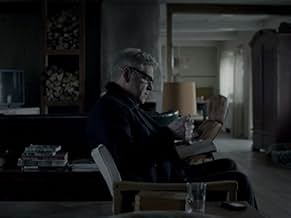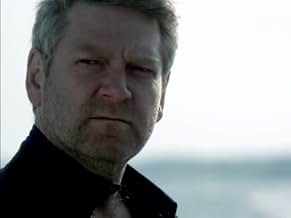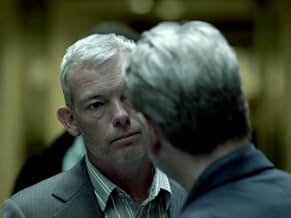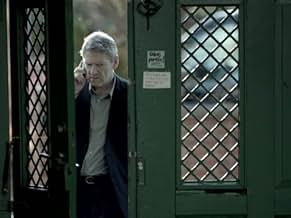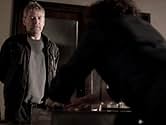Eine Fernsehsendung über einen seelensuchenden schwedischen Polizisten.Eine Fernsehsendung über einen seelensuchenden schwedischen Polizisten.Eine Fernsehsendung über einen seelensuchenden schwedischen Polizisten.
- Für 2 Primetime Emmys nominiert
- 12 Gewinne & 31 Nominierungen insgesamt
Folgen durchsuchen
Empfohlene Bewertungen
Both the first series of Swedish TV's Wallander and the second collection of British TV's interpretations have recently been aired on British TV, and whilstthey share a number of elements and qualities (locations, excellent filmatography, thoughtful and impressive 'takes' on the central figure of Kurt Wallander), it's the differences that seem to separate a good television drama from an outstanding one.
Obviously the two productions differ in a number of basic ways and it's worth highlighting these as a given. For the most part Swedish Wallander uses Mankel's stories as inspiration, creating unique plots per episode, whilst British Wallander uses the source material and thus far has for the most part faithfully adapted 6 of Mankel's books (interestingly the choice has been to adapt out of sequence, although the original stories were also published out of sequence, in Britian at least). An exception is the depiction of Kurt's father and his struggle with dementia, which logically has to progress through the overall TV series.
A second key difference is the interpretation of Kurt Wallander's relationship with his daughter. Swedish TV puts Linda into the police force from the outset, and uses this device to explore their legendary troubled relationship with the added frisson of professional, hierarchical tensions. Also into the mix is the relationship between Linda and her colleague Stefan Lindman. British Wallander maintains the original Linda/Kurt story arc, with Linda not yet having enrolled for police duty.
A third difference is the inclusion/exclusion of the Ann-Britt Höglund character. It seems the Swedish version quickly came to view this character as unnecessary within the looser story structure, as she is dispensed with well before Series One concludes. For British TV Höglund remains integral, just as she is in the books.
However, setting aside these givens, there are a number of factors which set the two interpretations apart in terms of quality, success and viewer experience. British Wallander is quite pacey, moving the story along briskly from scene to scene. Whilst this mostly works, it does occasionally occur at the expense of scene and/or character development - the camera (and therefore the viewer) is forced to follow Kurt, leaving other characters as cyphers. This is most notable during scenes with colleagues at police HQ. Swedish Wallander adopts a slower style, allowing characters and stories to develop and unfold with greater subtlety. This approach leads to a second and quite fundamental difference, and it is this element that underlines the superiority of the Swedish Wallander. The combination of writing, direction and editing for a slower pace allows the Swedish actors to effectively 'do less' and achieve more. Accordingly, Henricksson, Bergman, Sällström, Rapace et al are repeatedly given the time and direction to use economy and skill to enable the viewer to understand what they are thinking, feeling etc. The final episode of Series One was a particular example of this, with all concerned but particularly Sällström and Henricksson underplaying beautifully to create scenes of desperate sadness, bewilderment and loss whilst actually 'doing' very little. In comparison, a combination of misjudged casting and actors being let down by script and scene construction in the British version means for the most part the viewer receives less reward. Branagh, Warner and most notably McCabe as Nyberg are the exceptions, the former not least because Wallander remains the prime focus through the British drama, and is therefore given more time, scene-by-scene, and Warner because he is quite simply an experienced and clever film actor. Yet it is McCabe who shines, underplaying beautifully, especially during scenes in Episode 4 - The Faceless Killers.
Views on casting are always contentious. Suffice to say, the Swedish series has somehow managed to secure a host of clever actors who know a thing or two about camera work, and particularly scenes in close-up. From the moments of occasional humour gratefully received from Mörck's Ebba and Gunnarsson's Svartman (an incidental and unsung masterpiece of a performance) to the brilliance of Henricksson and Sällström, it's the Swedish production which holds the treats and subtleties and warrants repeat viewings.
The British Wallander is indeed watchable, but let's hope the BBC transmits Series 2 of the Swedish production as soon as possible, and let's also hope the absence of Rapace and Sällström doesn't diminish what has been an excellent television production.
Obviously the two productions differ in a number of basic ways and it's worth highlighting these as a given. For the most part Swedish Wallander uses Mankel's stories as inspiration, creating unique plots per episode, whilst British Wallander uses the source material and thus far has for the most part faithfully adapted 6 of Mankel's books (interestingly the choice has been to adapt out of sequence, although the original stories were also published out of sequence, in Britian at least). An exception is the depiction of Kurt's father and his struggle with dementia, which logically has to progress through the overall TV series.
A second key difference is the interpretation of Kurt Wallander's relationship with his daughter. Swedish TV puts Linda into the police force from the outset, and uses this device to explore their legendary troubled relationship with the added frisson of professional, hierarchical tensions. Also into the mix is the relationship between Linda and her colleague Stefan Lindman. British Wallander maintains the original Linda/Kurt story arc, with Linda not yet having enrolled for police duty.
A third difference is the inclusion/exclusion of the Ann-Britt Höglund character. It seems the Swedish version quickly came to view this character as unnecessary within the looser story structure, as she is dispensed with well before Series One concludes. For British TV Höglund remains integral, just as she is in the books.
However, setting aside these givens, there are a number of factors which set the two interpretations apart in terms of quality, success and viewer experience. British Wallander is quite pacey, moving the story along briskly from scene to scene. Whilst this mostly works, it does occasionally occur at the expense of scene and/or character development - the camera (and therefore the viewer) is forced to follow Kurt, leaving other characters as cyphers. This is most notable during scenes with colleagues at police HQ. Swedish Wallander adopts a slower style, allowing characters and stories to develop and unfold with greater subtlety. This approach leads to a second and quite fundamental difference, and it is this element that underlines the superiority of the Swedish Wallander. The combination of writing, direction and editing for a slower pace allows the Swedish actors to effectively 'do less' and achieve more. Accordingly, Henricksson, Bergman, Sällström, Rapace et al are repeatedly given the time and direction to use economy and skill to enable the viewer to understand what they are thinking, feeling etc. The final episode of Series One was a particular example of this, with all concerned but particularly Sällström and Henricksson underplaying beautifully to create scenes of desperate sadness, bewilderment and loss whilst actually 'doing' very little. In comparison, a combination of misjudged casting and actors being let down by script and scene construction in the British version means for the most part the viewer receives less reward. Branagh, Warner and most notably McCabe as Nyberg are the exceptions, the former not least because Wallander remains the prime focus through the British drama, and is therefore given more time, scene-by-scene, and Warner because he is quite simply an experienced and clever film actor. Yet it is McCabe who shines, underplaying beautifully, especially during scenes in Episode 4 - The Faceless Killers.
Views on casting are always contentious. Suffice to say, the Swedish series has somehow managed to secure a host of clever actors who know a thing or two about camera work, and particularly scenes in close-up. From the moments of occasional humour gratefully received from Mörck's Ebba and Gunnarsson's Svartman (an incidental and unsung masterpiece of a performance) to the brilliance of Henricksson and Sällström, it's the Swedish production which holds the treats and subtleties and warrants repeat viewings.
The British Wallander is indeed watchable, but let's hope the BBC transmits Series 2 of the Swedish production as soon as possible, and let's also hope the absence of Rapace and Sällström doesn't diminish what has been an excellent television production.
Other reviewers have already praised this series adequately. I only want to add that this series renewed my interest in seeing just about every film or TV presentation that Kenneth Branagh has acted in. He's been in some vehicles that weren't terrific, but he is unfailingly a great actor.
When you watch Wallander, and you see his eyes begin to well up with tears, or you see him struggling to get an answer to come out of his mouth, you really do forget you are watching an ACTOR. Branagh literally becomes Wallander and you think Wallander is a real person. It is partly the way the character is written, but much of the credit goes to Branagh.
Wallander is a man who struggles with words, so he is the opposite of Branagh, to whom words are golden. You can tell this from Branagh's interviews as well as from his performances. The visuals in the series are stunning, the plots are interesting, but it is Wallander's complex and troubled personality that really forces one to stay with the series. He's so real, so human. Don't miss it.
When you watch Wallander, and you see his eyes begin to well up with tears, or you see him struggling to get an answer to come out of his mouth, you really do forget you are watching an ACTOR. Branagh literally becomes Wallander and you think Wallander is a real person. It is partly the way the character is written, but much of the credit goes to Branagh.
Wallander is a man who struggles with words, so he is the opposite of Branagh, to whom words are golden. You can tell this from Branagh's interviews as well as from his performances. The visuals in the series are stunning, the plots are interesting, but it is Wallander's complex and troubled personality that really forces one to stay with the series. He's so real, so human. Don't miss it.
...Anything really! It has been a while since I bombed into a serie without any fantasy. Its situated in Sweden but they all speak english. Why make a remake in the first place...? I just dont get it. Cop is struggling with his private life. Thats about it...
10fm_4797
This is a series of high quality with storyline based on the successful novels of Henning Mankell and on an outstanding actor in the leading role.
Why you MUST see it?
If you prefer a series that is based on quality and not visual effects you should definitely go for it.
Why you MUST see it?
- Incredible character development! Wallander's personality is an open book to the viewer who is in sympathy with him and is able to share their feelings with him as the plot reveals itself. The series manages to depict a great and charming contradiction. Wallander is a compassionate inspector who suffers from the murders he encounters during his investigations. He is inappropriately compassionate for this job yet he does everything for it. Although misery follows his personal life he doesn't lose hope and believes in the goodness of people. This is that gives him the dimension of a hero even though he is presented incredibly ordinary and human who often make mistakes.
- Really good acting from the most of the cast.
- Amazing directing which transfers completely the atmosphere of Sweden. It is really good that BBC decided to film the series in Sweden as it provides ideal landscapes for photography and directing and greatly matches with the melancholic personality of Wallander and with the original script of course.
- Solid script that follows consistently enough Mankell's novels.
If you prefer a series that is based on quality and not visual effects you should definitely go for it.
While it does have its slow moments, and one or two plots may have moments that are hard to keep up. Regardless of how inferior it is or not to the 2005 series which is admittedly absolutely brilliant, this is still extremely good and any other flaws if any are compensated by the quality of how the series is made, constructed and acted. For instance, the Swedish setting is truly evocative and very often stunning. The music is haunting too, while the writing is of really good quality and the stories in general very well written. And then we have Kenneth Branagh, who I think is a great actor and more than decent director, especially in Shakespeare. He is brilliant as the dour and world-weary Kurt Wallander, and Sarah Smart, Jeany Spark, Rixhard McCabe and David Warner solidly support him. Overall, this is a well done television series. 9/10 Bethany Cox
Wusstest du schon
- WissenswertesMost Swedish critics consider this the best movie or television adaptation of the Wallander canon, in particular because of Sir Kenneth Branagh's performance. The most prominent newspaper in southern Sweden (where the series was set and filmed) acknowledged this with an article whose title translates as "Wåll-and-ör- The Real Wallander" (the first part pokes fun at the way Wallander's name is pronounced in English).
- VerbindungenFeatured in Breakfast: Folge vom 7. Juni 2010 (2010)
Top-Auswahl
Melde dich zum Bewerten an und greife auf die Watchlist für personalisierte Empfehlungen zu.
- How many seasons does Wallander have?Powered by Alexa
- Is there a Wallander Facebook Group?
Details
- Erscheinungsdatum
- Herkunftsländer
- Sprache
- Auch bekannt als
- Wallander
- Drehorte
- Produktionsfirmen
- Weitere beteiligte Unternehmen bei IMDbPro anzeigen
Zu dieser Seite beitragen
Bearbeitung vorschlagen oder fehlenden Inhalt hinzufügen








